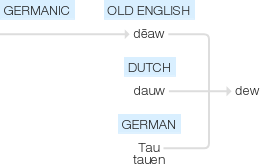Dew
Old English dēaw, of Germanic origin; related to Dutch dauw and German Tau (noun), tauen (verb).
wiktionary
From Middle English dew, from Old English dēaw(“dew”), from Proto-Germanic *dawwaz, *dawwą(“dew, moisture”), from Proto-Indo-European *dʰewh₂-(“smoke, haze”). Cognate with German Tau, Dutch dauw and Afrikaans dou. Doublet of dag.
From Middle English dewe, dewyn, from Old English *dēawian, from Proto-West Germanic *dauwēn, from Proto-Germanic *dawwāną. Cognates include Saterland Frisian daue, German tauen and Dutch dauwen.
etymonline
dew (n.)
"water vapor deposited from the atmosphere by condensation, especially during the night," Middle English deaw, deu, from Old English deaw, from Proto-Germanic *dawwaz (source also of Old Saxon dau, Old Frisian daw, Middle Dutch dau, Old High German tau, German Tau, Old Norse dögg "dew"), perhaps from PIE root *dheu- "to flow" (source also of Sanskrit dhavate "flows, runs").
Used figuratively of something refreshing (late Old English), or suggestive of morning and youthful freshness (1530s). As a verb, "to wet with or as with dew," Old English deawian.
The formation of dew is explained by the loss of heat by bodies on the earth's surface through radiation at night, by which means they and the air immediately about them are cooled below the dew-point ....Dew is thus deposited chiefly on bodies which are good radiators and poor conductors of heat, like grass; hence also it appears chiefly on calm and clear nights--that is, when the conditions are most favorable for radiation. It never appears on nights both cloudy and windy. In winter dew becomes hoar frost. [Century Dictionary]
